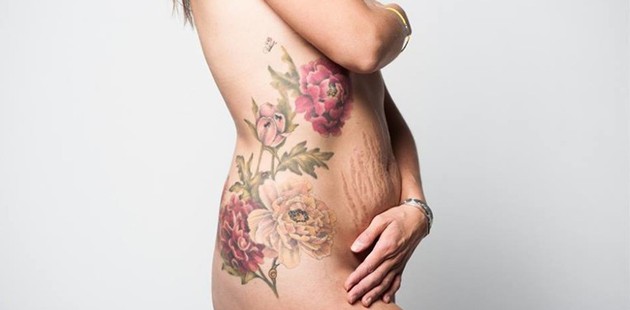It’s easy to feel down about your body after you have a baby. Things are shifted all over the place, you’re sore, your hormones are out of whack, and you’re next-level exhausted. Sex is often the furthest thing from your mind.
Doula & Sex Educator Tynan Rhea is offering two new workshops for new(ish) moms. These are in response to her survey, Sexuality Throughout Pregnancy. Pleasure After Kids (September 17) will explore ways to enjoy (and enhance) physical pleasures and intimacy after having kids. The other, Body Pride for Post Natal Babes (October 14) is a completely nude body image workshop with facilitated group conversations about post-partum bodies! We caught up with Rhea to get the deets.
What is Body Pride?
It’s a completely nude body image workshop (that means everyone who attends gets naked!) Each workshop consists of facilitated group conversations about post-partum bodies with snacks and a post-workshop naked dancing! It’s open to anyone who has ever carried a baby and birthed (C-section or vaginal) regardless of gender identity. It is a celebration of the different shapes, sizes, scars, and landmarks of birth. Many people have described these events as transformative, fun and beautiful.
Where’d you get the idea?
This Body Pride workshop is based off the original series, which Caitlin K. Roberts created as an opportunity for people to get naked, comfortable, and talk! Most of us don’t get many opportunities to hang around naked with each other and within a few minutes everyone is surprised at how quickly they acclimatize. I think comfort reminds us that bodies of all shapes and sizes and beautiful and worthy.
What if people are timid about disrobing completely right off the bat?
I’ve been to a few workshops with Caitlin, and I honestly haven’t met anyone who wasn’t ready to rip everything off! Generally, if you’ve already paid for the workshop, showed up, and walked inside the building, you’ve committed to what you’ve signed up for.
Why do we hold ourselves to such impossibly high physical standards, particularly after giving birth?
We are a cruel culture when it comes to bodies, particularly our ideas about what women should look like. During pregnancy and right after the birth, bodies go through massive changes that are completely out of a person’s control. It doesn’t matter how much you eat, exercise, love yourself, or are loved: that body does what it does to keep you and the baby safe. And thank goodness for that! But it’s hard because our hearts and our brains are affected by societal pressures based off arbitrary aesthetics to sell make up, diet programs, tummy tuckers and other billion-dollar industry crap.
Our standards for post-partum bodies aren’t any different from prenatal bodies. They’re the same, which is a problem for two reasons: 1. Your body has mechanisms in place to make sure you are a certain weight and size after birth to keep you healthy and safe that you cannot control nor should be able to control, and 2. Because there shouldn’t be a “standard” in the first place.
Can you give us some useful strategies to overcome post-baby body insecurity?
My favourite exercise is outlined in Emily Ngaski’s book, Come As You Are: look in the mirror every morning and pick a body part you like. It doesn’t have to be the part of your body you struggle with the most; in fact, it’s better to start somewhere simple and less charged. Out loud, tell yourself why you like it. For example, “I love you eyelashes for keeping the dust out of my eyes.” Hopefully, more and more body parts make it onto that list as time goes by.
I think it’s also important to remember that you’re not going to feel amazing about your body every day and that’s completely okay. A good friend and mentor of mine, Tracey Tief, once said to me, “You don’t have to own every thought.” I loved that. It was completely freeing. So on the days when I look into the mirror and think, “I’m looking swollen,” (it’s my gentle way of saying I look larger than I’d like to be) I think, “I’m not owning that thought. That thought is not mine. I like the way I look because it’s the way I look.” Sometimes that’s the best I can do for that day. And that’s okay!



 Follow Us On Instagram
Follow Us On Instagram
